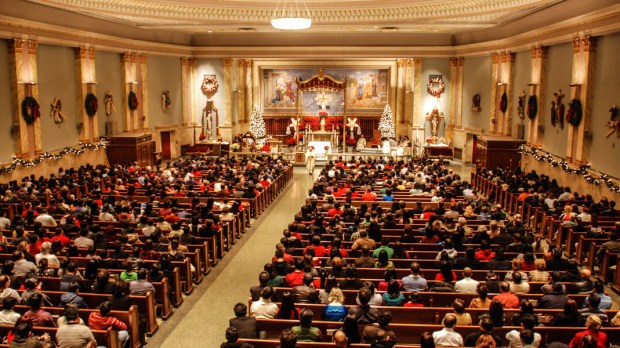Some Christians are concerned that the contraction “Xmas” erases Christ from Christmas. In fact, “X” comes from the Greek letter chi for Christ, being Χριστος (Christos). According to the Online Etymology Dictionary,Xres mæsse for “Christmas” appears in the Anglo-Saxon Chronicle (c. 1100), and X’temmas was recorded as a common abbreviation in 1551.
The New Advent Catholic Encyclopedia notes:
“The word for Christmas in late Old English is Cristes Maesse, the Mass of Christ, first found in 1038, and Cristes-messe, in 1131. In Dutch it is Kerstmis, in Latin Dies Natalis, whence comes the French Noël, and Italian Il natale; in German Weihnachtsfest, from the preceeding sacred vigil.” (Weihnacht = Hallowed/Holy Night)
What Catholics should be really concerned about is how everyone seems to have forgotten what “mas” stands for – Mass! Just as Christmas is incomplete without Christ, so it is incomplete without Mass.
In English Catholic tradition, many of our holy days have contracted names ending in “-mas”: Roodmas for the Feast of the Exaltation of the Cross; Marymas for the Solemnity of the Assumption; Michaelmas for the Feast of St. Michael (now the Feast of the Archangels); Hallowmas for All Saints’ Day; Soulmas for All Souls’ Day; Martinmas for the Feast of St. Martin of Tours; Childermas for the Feast of the Holy Innocents; Candlemas for the Feast of the Presentation of the Lord.
Another thing to be concerned about is how the celebration of Christmas has crept backward into Advent, and when the Christmas season is really here, people stop celebrating after only the first day!
Sixty years of advertising broke two millenia of Christian practice. Halloween has now become the closest thing we have to an Advent season. Advent is now a four-week long Christmas season, and Christmas season is now Purgatory. —Steve Kellmeyer, “Nailing Christ to the Cross”
Christmastide used to run for 40 days, from December 25 to Candlemas on February 2. Although after Vatican II, Christmas only runs to the Feast of the Baptism of the Lord, which falls on the Sunday after Epiphany (the Twelve Days of Christmas really run from Christmas Day to Twelfth Night, the vigil of the Epiphany – not during the last weeks of Advent, when we should be concentrating on the O Antiphons), we should appreciate the entire season of Christmas as a liturgical gift from the Church. It is the paramount time to contemplate the incarnation of God and what it means for humanity’s salvation from sin and death.
We ought to consider especially the Octave of Christmas, ending on New Year’s Day. Monsignor Charles Pope explains:
Most people think that Christmas Day is one day called December 25th. That is not accurate. It is the Catholic practice that we celebrate the “Octave” of Christmas. (We do the same thing with Easter). So important is this feast that we celebrate it for eight whole days (Dec 25,26,27,28,29,30,31, Jan 1). But the “Octave” is really considered one long day. Upon the completion of this long day, on January 1 the Birth”day” of Christ is complete and our calendars advance to the next year. – Msgr. Charles Pope, “Why is it 2011? (or) Why New Years is Not Simply Secular”
The tradition of celebrating an octave comes from the Old Testament, where Jews spent eight days celebrating feasts like the Passover and the feast of Tabernacles (Sukkot). As Chris Stefanick says:
There ain't no party like a Catholic party cause a Catholic party lasts 8 days…
— Chris Stefanick (@ChrisStefanick) April 21, 2014
So, be sure to revel in the full celebration of the Nativity of Our Lord, and don’t sell yourself short like the secular world does! The holy paradox of Eternity stepping into Time to offer the gift of eternal salvation to mankind, a sharing in the life and love of God – that surely merits prolonged reflection and prayer, culminating in the Solemnity of Mary, Mother of God on the Octave Day of Christmas.
Merry Christ’s Mass!

